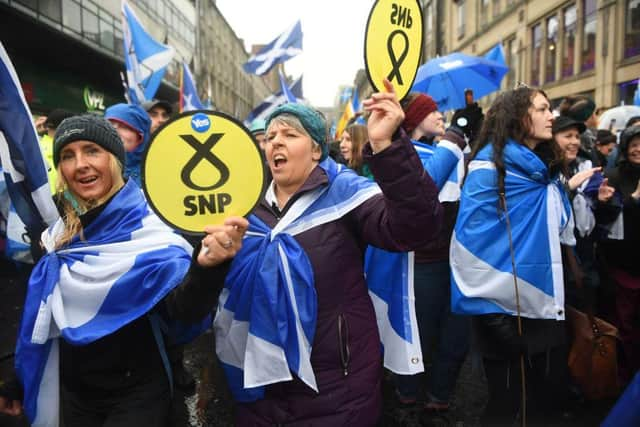Analysis: Why Nicola Sturgeon's language on independence marks a change from rubbishing 'super-majority' concept
The Alba party leader labelled the deal as “student politics”, claiming he would never have let the party anywhere near government, helpfully ignoring his own self-proclaimed “negotiating triumph” of bringing the Greens on side in 2007 to propel him to the position of first minister.
There will be part of the former SNP leader that will be smarting, or potentially enjoying, the change of tune from Nicola Sturgeon around what such a deal means for Scottish independence.
Advertisement
Hide AdAdvertisement
Hide Ad

With language perilously close to that of her predecessor, Ms Sturgeon is now calling on her party membership to back the deal to “cement the pro-independence majority at Holyrood”.
It is a marked change from the approach during the election campaign where the First Minister regularly rubbished claims a “super-majority”, as ill-defined as it was and remains, would change the politics of the situation.
Speaking on BBC Radio 4 at the time, she said: “People who are serious about achieving independence understand that, and I actually think talk of ‘super-majorities’ and ‘gaming the system’ and trying to bulldoze our way to independence almost regardless of the state of public opinion risks putting those that we need to persuade of the case for independence off.”
It is clear that ‘cementing’ the pro-independence majority will make little to no difference to Boris Johnson.
After all, the maths hasn’t changed. In any vote around an independence referendum bill, the Greens would have been on board while in government or not.
Westminster may have changed to ‘when’, rather than ‘if’, but the gift of indyref2 is in their hands.
The change of language is therefore aimed squarely at sedating her party’s increasingly fidgety membership.
This is not a one-off. Ms Sturgeon regularly claims elections are not about independence, only to later claim every vote for the SNP is a vote for independence.
Advertisement
Hide AdAdvertisement
Hide AdThe SNP leader knows talk of imminent independence spooks key swing voters, but also that she must keep her more fanatical membership onside.
Such talk of pro-independence majorities also helps sell the narrative of ‘undemocratic Westminster’ needed to justify indyref2.
But Ms Sturgeon will know her words are just that and will not lead to action anytime soon.
A message from the Editor:
Thank you for reading this article. We're more reliant on your support than ever as the shift in consumer habits brought about by coronavirus impacts our advertisers.
If you haven't already, please consider supporting our trusted, fact-checked journalism by taking out a digital subscription.
Comments
Want to join the conversation? Please or to comment on this article.
